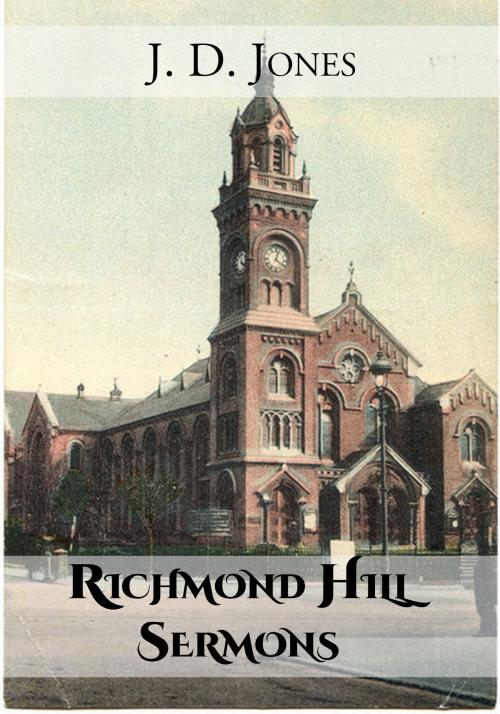Richmond Hill Sermons
Nonfiction, Religion & Spirituality, Christianity, Christian Sermons, Christian Literature| Author: | J. D. Jones | ISBN: | 1230001930924 |
| Publisher: | CrossReach Publications | Publication: | September 24, 2017 |
| Imprint: | Language: | English |
| Author: | J. D. Jones |
| ISBN: | 1230001930924 |
| Publisher: | CrossReach Publications |
| Publication: | September 24, 2017 |
| Imprint: | |
| Language: | English |
It is with the present-day application of the words of my text I am concerned, so I do not propose to spend much time in examining and explaining the context. Let it be sufficient to say that it was of the returned Israel the prophet first wrote or spoke these words. Ever since the deportation to Babylon the Holy Land had lain desolate and waste; Jerusalem was in heaps; its walls were shattered and in ruin; the other cities and towns were left without inhabitants; the roads and paths which led from one place to another, once trodden by busy feet, were now overgrown and broken up. And what the prophet says here is that the returned exiles, provided they fulfilled certain conditions—and the conditions were really these: that they should be truly God’s people and that their religion should reveal itself in life—should be able to rebuild the old wastes, to re-erect their ruined and shattered cities, to reconstruct their broken civilisation, so that this returned Israel would gain the titles “The Repairer of the breach; the Restorer of paths to dwell in.”
Now I am not going to concern myself any further with the returned exiles and the restoration of ravaged and devastated Palestine. The New Testament counterpart of Israel is the Christian Church. And what I see in my text is a suggestion as to the office and function of the Church in the world—it is to be the Repairer and the Restorer. Not that the Church has literally to reclaim ruined land and rebuild broken and shattered cities. Its work goes deeper down than that. It has to do with a world morally broken and spiritually desolate. From the merely material point of view, the plight of our world is serious enough. Civilisations have been shaken, states have been shattered, commercial and business systems have been overthrown. The efforts of statesmen for the past two or three years have been devoted to the task of “raising up again the foundations of many generations,” propping up these civilisations of ours that threaten to totter to their fall, reconstructing the shattered fabric of international trade. But they are finding it a desperately difficult business. And the reason for that is that the ruin of our world is not material simply; it is spiritual also. Material methods of alleviation would be sufficient for material ruin. But they are altogether inadequate for a world that is spiritually broken and bankrupt. Spiritual troubles demand spiritual remedies. So in the reconstruction of the world the Church, with its gospel, has its part to play. There are great breaches which only the Church, with its gospel, can repair; there are broken and neglected ways to peace and blessing which only the Church can restore. And that is what I covet for the Christian Church, that in these days she should be known as “the Repairer of the breach: The Restorer of paths to dwell in.”
It is with the present-day application of the words of my text I am concerned, so I do not propose to spend much time in examining and explaining the context. Let it be sufficient to say that it was of the returned Israel the prophet first wrote or spoke these words. Ever since the deportation to Babylon the Holy Land had lain desolate and waste; Jerusalem was in heaps; its walls were shattered and in ruin; the other cities and towns were left without inhabitants; the roads and paths which led from one place to another, once trodden by busy feet, were now overgrown and broken up. And what the prophet says here is that the returned exiles, provided they fulfilled certain conditions—and the conditions were really these: that they should be truly God’s people and that their religion should reveal itself in life—should be able to rebuild the old wastes, to re-erect their ruined and shattered cities, to reconstruct their broken civilisation, so that this returned Israel would gain the titles “The Repairer of the breach; the Restorer of paths to dwell in.”
Now I am not going to concern myself any further with the returned exiles and the restoration of ravaged and devastated Palestine. The New Testament counterpart of Israel is the Christian Church. And what I see in my text is a suggestion as to the office and function of the Church in the world—it is to be the Repairer and the Restorer. Not that the Church has literally to reclaim ruined land and rebuild broken and shattered cities. Its work goes deeper down than that. It has to do with a world morally broken and spiritually desolate. From the merely material point of view, the plight of our world is serious enough. Civilisations have been shaken, states have been shattered, commercial and business systems have been overthrown. The efforts of statesmen for the past two or three years have been devoted to the task of “raising up again the foundations of many generations,” propping up these civilisations of ours that threaten to totter to their fall, reconstructing the shattered fabric of international trade. But they are finding it a desperately difficult business. And the reason for that is that the ruin of our world is not material simply; it is spiritual also. Material methods of alleviation would be sufficient for material ruin. But they are altogether inadequate for a world that is spiritually broken and bankrupt. Spiritual troubles demand spiritual remedies. So in the reconstruction of the world the Church, with its gospel, has its part to play. There are great breaches which only the Church, with its gospel, can repair; there are broken and neglected ways to peace and blessing which only the Church can restore. And that is what I covet for the Christian Church, that in these days she should be known as “the Repairer of the breach: The Restorer of paths to dwell in.”















